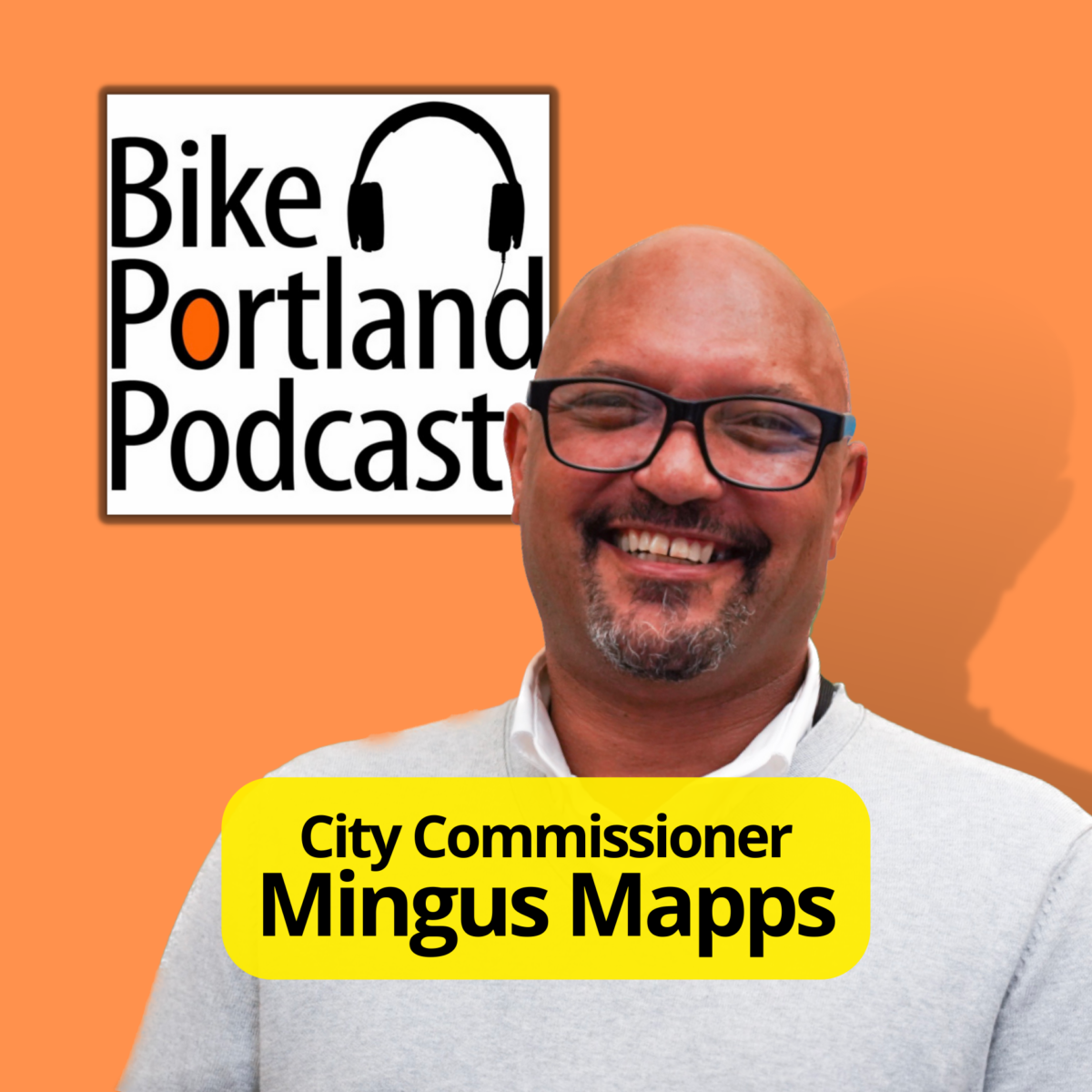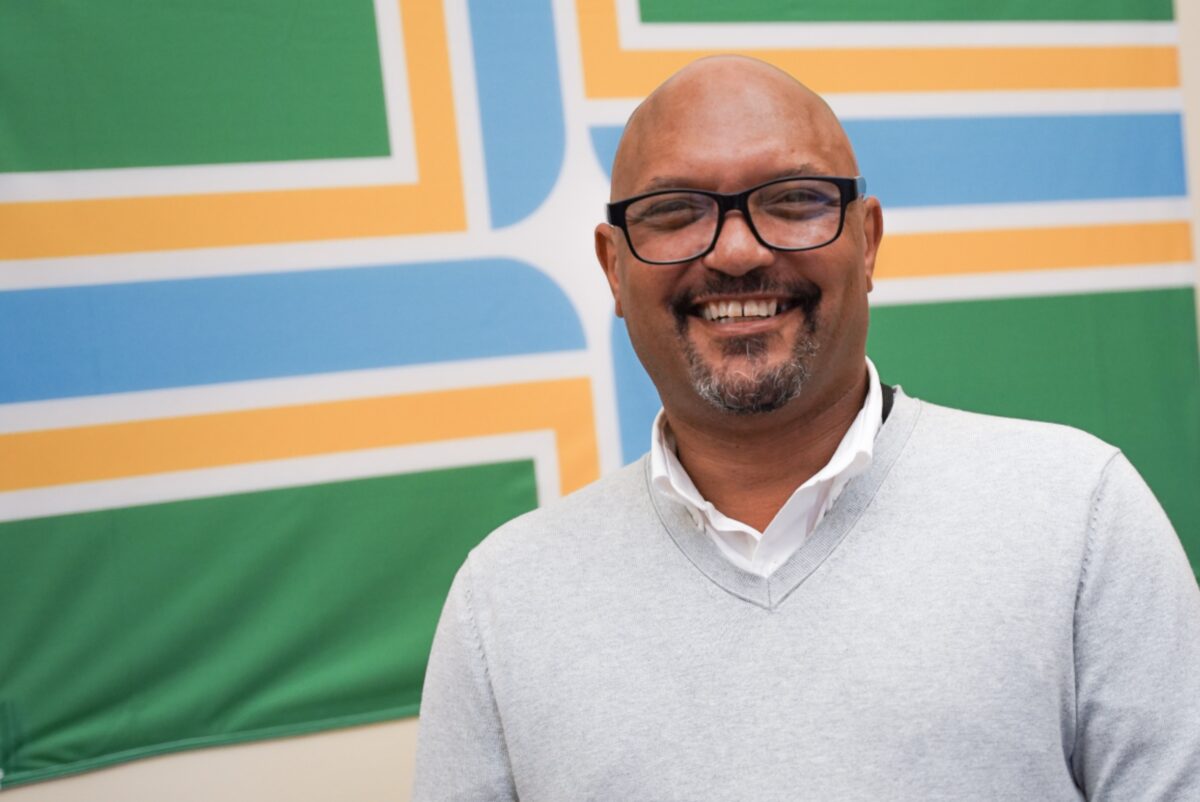For our latest episode, I rode down to City Hall and recorded an interview with Portland City Commissioner Mingus Mapps (luckily I only got rained on during my way home). Mapps has served as one of Portland’s five council members since 2020, and was recently named the commissioner-in-charge of the transportation bureau.
Mapps is a graduate of Reed College, he has a PhD in government from Cornell and is a former political science professor. Prior to ousting former Commissioner Chloe Eudaly from her seat in 2019, Mapps worked for the City of Portland’s Office of Civic Life.
Commissioner Mapps and I covered a lot of ground in this interview. We talked about the type of person he’s looking to hire as the next director of PBOT, how he thinks transportation policy and projects can help revitalize Portland, why he thinks the 2030 bike plan is outdated, his rationale for wanting more police officers on Portland streets, his position on automated enforcement cameras, the I-5 Rose Quarter project, and much more.
Listen to the full episode in the player above or wherever you get your podcasts. An edited version of our conversation is below…
What’s it been like being thrust into being the leader of the transportation bureau over the last three months?
Oh, my gosh, I don’t even think it’s been three months. I think it’s been two months and three days. And I’ll tell you in that time. The director of the Bureau who was very much looking forward to working with, resigned. We had a strike. And we had the second largest snowstorm, I think of the past 50 years. So it has been and an enormously hectic but exciting time. I’ve seen the bureau step up to a number of different challenges in a way that really makes me proud to be part of this team. And in addition to those sort of day-to-day operational things, Portland and Oregon is going through some really fascinating and important conversations about what the future of transportation infrastructure looks like. So it’s an incredibly exciting time to be here.
Portland has been through a lot in the past few years, and we are often lauded for our legacy of smart transportation and urban planning decisions — yet at at time we need those type of decisions most, it seems to me like those issues are on the backburner in City Hall. Do you think transportation infrastructure and urban planning policies should play a big role in Portland’s revitalization?
I don’t know if I can comment on the importance of transportation receding from City Hall in recent years, but it’s incredibly important to me. And I can tell you, I get to sit on a lot of planning tables and a lot of budget tables and moving forward, transportation is going to be core to the city’s revitalization, and the state’s revitalization and what the future of our community looks like. It’s not just about moving vehicles back and forth. It’s about how we live. I think we’re at the precipice of a new and exciting chapter in transportation, where infrastructure is going to emphasize cars less emphasize public transportation, biking and walking. I’ll also tell you, a lot of the old models for funding transportation infrastructure have become obsolete, which is both a crisis but it also is an opportunity to reimagine how we go about supporting infrastructure. And frankly, that’s kind of a good thing, because our old systems for funding infrastructure in the transportation realm have not served us well. So I’m very psyched about the 21st century.
When it comes to transportation, what is something we are not doing well in Portland?
As the guy where the buck stops on our transportation infrastructure, I’m horrified and upset about the number of traffic deaths we see out there. You know, literally driving a vehicle is a scary experience. And I think driving a bicycle in Portland is often a scary experience. And I will tell you, we need to manage this better as we head into what I expect to be a couple of decades of growth, where we have more people, you know, in a confined space. This won’t work unless we reimagine how we help people get to where they want to go.
What qualities are you looking for in the next leader of PBOT?
We need both a visionary leader who can help reinvent our our transportation infrastructure for the 21st century, and at the same time, this person needs to be able to help PBOT navigate the transition to a new form of government. My bureau directors — from water, environmental services and PBOT — literally sit around the same table that you and I are sitting at and we talk about how we can work together better, where we want the at these bureaus to look like as we move to a new form of government. You know, questions as radical is, you know, ‘Are these going to be separate bureaus three years from now? Five years from now? So you need someone who can navigate all of those changes. At the same time at PBOT, you know, over the next five years, we have a structural $60 billion deficit. Our next PBOT director needs to imagine and build the roads and sidewalks and bike lanes of the future, maintain the 1000s of miles of infrastructure — and you need to do it as your budgets are at least for the short term, shrinking.
Has anyone at PBOT briefed you about bicycling or the 2030 Bike Plan?
We haven’t had a formal briefing on it yet. It is definitely coming up. PBOT is an enormously large and complex organization. We haven’t gotten to the bike plan yet, but it’s literally on our list. And I will tell you, I’m a reader and fan of BikePortland, so I’m aware of the history here. I’m aware that we are not achieving our goals. And I’m committed to actually making Portland a better and safer place for people to bike.
The decline in bike ridership started in 2014 and it’s been flat or going down since then. From your perspective, do you think that’s a problem? And what what should we be doing about it?
I certainly want to diversify the way the ways in which people get to where they want to go… we definitely want to increase the amount of miles that people commute in Portland on bike, I think part of that means infrastructure, for sure. I think there’s a lot of work that needs to be done here. And frankly, one of the things I hope I can at least launch in the two years I have left on this council is to revisit the bike plan to see where we could do better. That bike plan was put together under Mayor Sam Adams at a time when Portland was very different and I think a lot of those assumptions that we had then are just different.
Do you think it’s time to invest more public funds into our bike share system?
We’re in conversations around how to get more bikes and better bikes out there. I’m hopeful that those conversations will bear fruit.
How would you respond to someone who is irate about a traffic diverter near their home or a business owner mad about parking removal?
Over my time at as Commissioner of PBOT I fully expect to piss off people who wish that there were no bikes on their streets. And I fully expect that the bike community will hold me accountable for not building enough bike lanes — it just has to be a balance. And what we’re trying to do is optimize the infrastructure we build and the culture that we build. We’re trying to optimize the trade-offs that we have to confront.
Should there be space for cycling on 82nd Avenue?
I’d have to take a look at what the plans there are. I think that we’re definitely looking at bike lanes in that space, or at least I believe we’re looking at bike lanes in that space. And, you know, we’ll be in conversation with the community about figuring out what the right solutions for the folks who live along that street.
How would you characterize PBOT’s relationship to the Rose Quarter freeway expansion project?
I think it’s a really exciting project. You know, it’s represents an opportunity to reimagine that neighborhood to a large degree. So this is not just about roads, it’s not just about moving cars, it’s about moving people and an opportunity to do a lot of — I hope — equitable economic development… This is a real opportunity to lay the infrastructure that we need to make this a vibrant neighborhood. So we’re very excited about the concept of it.
But do you have trust that ODOT can actually pull that off?
I would I would reframe the way this discussion is playing out. There is a robust discussion happening right now, between stakeholders about what this infrastructure looks like. ODOT because of their mission, has a particular perspective. But ODOT is not the only player at the table. The City of Portland cares about this a lot. Local businesses care about this a lot. Albina Vision cares about it a lot. The Trail Blazers care about it a lot. We’re all in conversation trying to figure out how to make this project work. And frankly, this is a top priority to figure out how to make this space work for everybody.
What is your assessment is of where PBOT is right now in their relationship to the Portland Police Bureau and enforcement of traffic laws?
I believe it’s time… I think the city needs to step up its traffic enforcement work. In the last five years, traffic deaths in Portland have roughly doubled. It’s not like our infrastructure has gotten dramatically worse during that time. Frankly, it’s not really even like, you know, the amount of car traffic on the roads has dramatically increased. What has increased or changed during this time is the fact that we got out of the business of traffic enforcement.
So you want more police on the street enforcing traffic laws?
Yeah. I think I can say that. Traffic deaths have increased dramatically. I think it also contributes to a broad sense of Portland being a lawless place. You know, every day I see someone run a red light in Portland, which is kind of remarkable. And I don’t think I’d seen that before.
Are you a fan of automated cameras? And can you help us understand why there aren’t more of them?
Oh, absolutely. I am a fan. You will see more of them in the next two years. Frankly, I believe in the next year, I will double the number of traffic cameras and speed cams that we have out there right now. And frankly, you would see more, but the bottleneck here has to do with the supplier of the cameras, we are not able to find a contractor who could consistently provide the service at the volume that we need it.
When it comes to transportation in Portland, what policy or project do you want your tenure to be remembered?
I’m working towards building greener transportation infrastructure. I’m working towards building a more equitable transportation infrastructure. And I’m working on providing and establishing a stable and sustainable financial model for funding.
Listen to the full episode in the player above, or wherever you get your podcasts. You can see past episodes at BikePortland.org/podcast.





